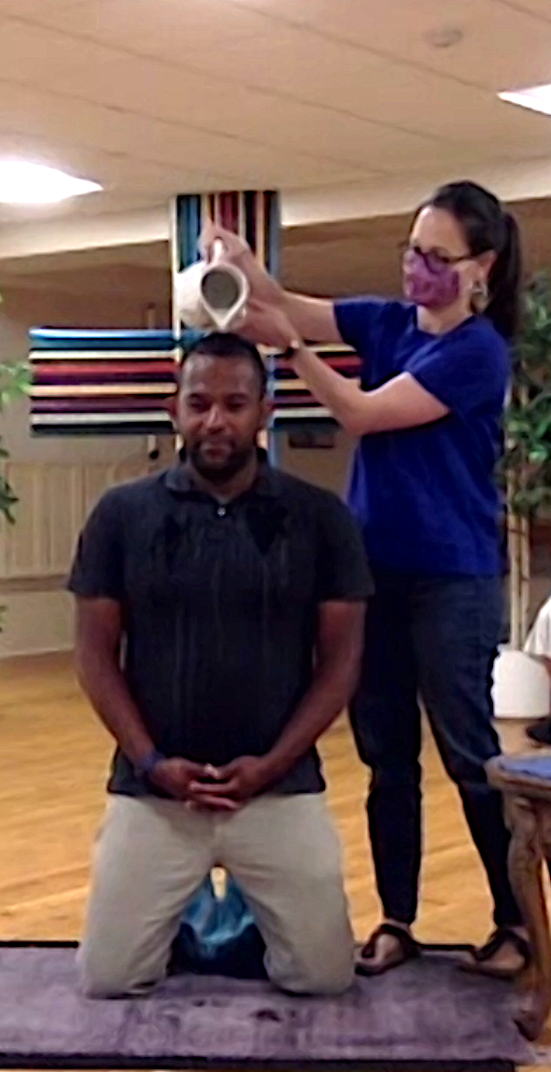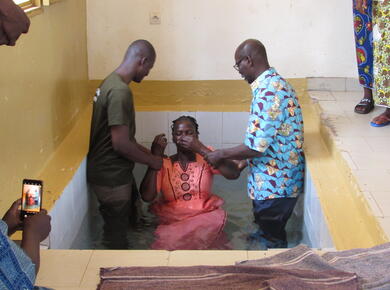Posted: December 6, 2021
Following a 5-year conversation with theologians from the Roman Catholic and Lutheran traditions, the Faith and Life Committee invited the members of Mennonite World Conference to consider our practices of Anabaptist together at Renewal 2027 in two webinars entitled “Believe and Be Baptized: A Global Conversation on Baptism.”
The second webinar examined the report: Baptism and Incorporation into the Body of Christ, the Church — Lutheran-Mennonite-Roman Catholic Trilateral Conversations 2012–2017.
Thomas R Yoder Neufeld interviewed Larry Miller, co-secretary of the Mennonite delegation in the trilateral conversations.
Learning from the Mennonite-Catholic-Lutheran Conversations on Baptism
Tom Yoder Neufeld
Can you tell us how these conversations came about?
Larry Miller
The trilateral conversation on baptism grew out of two previous Mennonite World Conference conversations, one with the Catholic Church (1998-2003) and the other with the Lutheran World Federation (2005-2008). In each case, it was the first official conversation at the global level between these churches and the Anabaptist-Mennonite family of faith since the conflicts of the 16th century – conflicts not least over the meaning and practice of baptism.
The goal of each of those conversations was better understanding of and better relationships with one another.
A foundational point of divergence highlighted in both conversations was baptism.
The question of focused conversation on baptism arose with these two churches at about the same time (2009-2010). MWC leadership agreed that such conversation was important, but thought that we could not undertake simultaneously two global conversations on baptism. So, we proposed a trilateral dialogue.
Tom Yoder Neufeld
Were there surprises, both positive and negative?
Larry Miller
Yes, there were some of each of those for the MWC delegation.
We were surprised to hear the Catholic delegation report that some Catholic theologians refer to adult baptism as “normative” in Catholic doctrinal and liturgical history since, as they said, “it is the form that fully expresses the meaning of baptism” and that Catholic “history clearly shows that it is the rite for adults that is the model of the baptismal process” (Report, §79 and footnote 97).
We were surprised by the ready theological agreement on the different elements included on the path of incorporation into the church and life in the body of Christ: the loving initiative of God’s grace, the human response of faith and commitment, times of catechism and spiritual formation, a life-long process of growing in the faith and discipleship.
We were surprised by how strongly the three delegations agreed that baptism is for discipleship. Baptism into discipleship is not only a Mennonite thing!
For me, this is one of the most important fruits of the conversation. “All three of our churches see repentance, faith and committed discipleship as necessarily related to Christian life within the body of Christ, the Church, which has as one of its essential starting points the celebration and reception of baptism” (Report, §79).
I was surprised and humbled to feel that it seemed more difficult for us Mennonites to confess the tension between our ideal theology of baptism and the way we too often don’t live out the implications of our baptism than it seemed to be for the Catholic and the Lutheran delegations to confess the gap between their theology and, sometimes, their practice.
I was surprised and embarrassed to learn, as I listened to the Catholic and Lutheran delegations, how little I have considered the deep pain some Catholics and Lutherans feel when we automatically reject the validity of their baptisms, especially when they opened the path of the baptized to repentance, confession of faith, and a life of discipleship.
Tom Yoder Neufeld
Were there obstacles that emerged during your interactions?
Larry Miller
How were we to present contemporary Anabaptist-Mennonite understandings and practices given the diversity of understandings and practices in our worldwide family of faith today?
As general secretary of MWC for a couple of decades, I was deeply aware of this diversity. Even between the several different churches from which delegation members came, there was significant diversity. This is why in the “Concluding Mennonite Reflections” of the report (§116-133) the delegation speaks only for itself: not for Mennonite World Conference, not for the wider Anabaptist-Mennonite family of faith.
After five years of meetings, each one with multiple presentations and intense debate, how do we write a final report that can only include what each delegation considers essential?
Tom Yoder Neufeld
What were the greatest gifts received? Did you come away grateful for what God has graced us with, in our own communion in relation to baptism?
Larry Miller
I did come away grateful for what God has given to the church through the Anabaptist-Mennonite family of faith, thanks to our understandings and practices of baptism. In these conversations and already in the preparation for them, I saw more clearly the significance of this gift not only for ourselves, but for the entire Christian church.
The conversations made clear how significantly the situation has changed since the 16th century.
Then, believers baptism as practiced by Anabaptists provoked hostility and sometimes persecution by Lutheran and Catholic authorities.
Now, those churches officially recognize and respect Anabaptist-Mennonite baptism of persons not previously baptized. I think that this transformation is a sign that God’s grace has worked through us in spite of our weaknesses and failures.
What are the greatest gifts offered to us in this dialogue?
The “challenges” we received from the other churches (cf. paragraphs 124-130), especially:
- The challenge to better hold together in our understanding of conversion and baptism an awareness of our continuing tendency to go against God, on the one hand, and the possibility of faithfully following Jesus Christ, on the other.
- The challenge not to allow our concern for the human response in conversion, commitment and baptism to overshadow God’s initiative in every aspect of salvation, including baptism. Adult baptism begins with God’s act of grace, not with my personal confession of faith. Discipleship depends on God’s enduring grace, not on my proper baptism.
- The challenge to develop greater consistency and depth in preparing people for baptism and in making remembrance of our baptisms a recurrent motif of discipleship. Believers baptism is a life-long journey not a one-day event, even if it is adult baptism.
If we take these challenging gifts seriously, I believe that we will be enriched immeasurably.
Tom Yoder Neufeld

The Mennonite delegation have put recommendations to us as churches of the MWC: namely, that we “consider” taking into membership those who were once baptized as infants, who have owned their baptism and lived it out faithfully, and that we do so without requiring (re) baptism. Could you elaborate on that?
Larry Miller
At the end of the trilateral conversation and report, the MWC delegation reaffirmed the “historic belief” of Anabaptist-Mennonite churches that “the baptism of believers is the normative teaching and practice of the New Testament” and that “this teaching and practice is normative today” (§131).
Anabaptist-Mennonite believers “with the whole body of Christ in trinitarian faith lived out through trust in and obedience to Jesus Christ” (§132). Taken together, these two affirmations raise implicitly the question of how we bear witness to oneness in Christ when we are divided in some aspects of our understandings and practices of a foundational Christian act, baptism
The problem may not be quite as great for the Catholic church and for Lutheran churches. Both are deeply pained by our rejection of their infant baptisms since they feel it is also a rejection of what they believe to be Christ’s gracious action and promise, in infant baptism, of communion with Christ.
Nevertheless, today, both officially recognize and accept as valid Anabaptist-Mennonite baptism of persons not previously baptized.
They have moved a long way since the 16th century!
The situation may be more difficult for us since we do not affirm or practice infant baptism. It may be most complicated for us in those cases where a person seeking membership in an AnabaptistMennonite church was baptized as an infant but has previously, as an adult, confirmed personal faith in Christ and been living a life of committed discipleship. Must that person be baptized again? Or is a public personal confession of faith and commitment to continued discipleship sufficient for membership in an Anabaptist congregation?
In regard to a still more specific question, what should an AnabaptistMennonite church do if the candidate for church membership requests rebaptism? Could the process of discernment prior to reception of th is believer into the Anabaptist-Mennonite church include a conversation between the candidate, the church of origin, and the receiving church out of respect for one another, to bear witness to one another, and thus together to seek more unity in the body of Christ, including the local body of Christ?
The delegation proposed (§133a) that consideration be given these questions by our churches as we seek to affirm both baptism for following Christ – discipleship – and oneness in Christ.
The delegation also proposes (§133c) that, however these questions are answered, our churches ask all members – including those being received from churches with infant baptismal practices – to affirm our historic understanding and practice of adult believers baptism.
and practice of adult believers baptism. I would like to call attention to the fact that the delegation suggests several other ideas for consideration which may contribute more significantly to the shaping of our churches’ spiritual life than does the matter of how we receive believers baptized as infants (cf. §133d-f)
Specifically, the delegation suggests that our churches consider:
- Looking for ways of enriching or developing practices of thanksgiving and blessing for infants, for their parents, and for the local nurturing congregations.
- Providing occasions for all members to “remember their baptism” and to renew their baptismal commitment to a life of discipleship.
- Reflecting on why it has been so difficult for many churches of our tradition to hold together faithful discipleship and unity with one another and with others. We are a church known ecumenically not only for adult baptism and Christian discipleship but also for church splits.
Tom Yoder Neufeld
Any final comments you’d like to share?
Larry Miller
The report is published “as a study document” – not as a legislative document – in the hope that, through wide discussion both within the three communions and beyond, it will contribute to “better mutual understanding and greater faithfulness to Jesus Christ.”
That is certainly my hope: that our three communions grow in faithfulness to Jesus Christ.
Tom Yoder Neufeld
It is my prayer and all of ours that the efforts of you and the others who participated in these six years of conversation will enable us to become more faithful to our baptismal vows in how we live out our new life in Christ.

Surprising gifts
We can sense the great gift that comes when sisters and brothers, who have often been deeply at odds with each other, take courage to live into the unity we have in Christ. This is a unity not dependent on agreement, but on the foundational reality that it is the same God who in Christ, through the Spirit, has brought us together into the one body of Christ.
We practice believers baptism because practically all our members are converted members. (They don’t come from a Mennonite or protestant or evangelical family.) Baptism is an important part to commit to following Jesus with a community of believers who confess Jesus as their Lord and Saviour and together they want to follow Jesus. —Carlos García Martínez, Mexico
In this exchange with Catholics and Lutherans we have an example of that gift of the Spirit being received together with communions we have been deeply estranged from over one of the central events in a Christian’s life, baptism.
Let me highlight a few “surprising gifts” from the report.
Grace
For Catholics and Lutherans, baptism is first and foremost God’s act of grace. God is the actor in this sacrament, whether baptism of infants or adults. This is how God deals with “original sin” and begins the lifelong work of transformation and incorporation into the body of Christ.
This can help us understand why Catholics and Lutherans believe it is important to offer such saving grace already at the very beginning of a person’s life. True, faith is required, but in cases of infants it is primarily the faith of parents and church. We can then also better understand why Catholics and Lutherans are troubled by Anabaptists rejecting the baptism of infants. In their eyes, we are rejecting the gracious action of God.
Of course, as Anabaptists, we too treasure God’s grace. In the Anabaptist understanding it is God’s grace through the Spirit that calls persons and enables them to seek God, to offer their lives to God, and, finally, in baptism to pledge themselves to following Christ in discipleship and participation in the local gathering of believers.
All of that is the enabling and saving grace of God at work – before, during and after baptism.
Nevertheless, might we too easily lose sight of God’s grace when we as Anabaptists put such emphasis on the believer’s own decision to seek baptism, and to commit to discipleship and church?
Discipleship
Another surprising gift Larry identified was to learn that discipleship is not a Mennonite or Anabaptist concern only, but one Catholics and Lutherans share.
Of course, there were serious differences among the delegations on what discipleship looks like.
For example, one serious difference between the communions is how the church relates to the state and its demands, especially the bearing of arms. And that connects, of course, to the central importance Anabaptists place on nonresistance and nonviolence.
All agreed strongly, however, that baptism is intimately linked to discipleship, to “living out our baptism,” as they put it in the Report.
Falling short in living out our baptism
All three communions named and lamented the great distance that exists between often beautiful and profound theology of baptism, on one hand, and the way many of the baptized fail to “live out their baptism,” on other.
We can join Catholics and Lutherans in stressing the importance of formation, as the Catholics put it, or “remembering baptism” as Lutherans like to speak of it.
Perhaps as Mennonites we can recover something of the basic meaning of being a disciple, namely, to be a student, a learner. And that means also teaching about baptism and how to live it.
Taking up the invitation of Mennonites “to consider”
The Mennonite delegates fully affirm that “believers baptism” is the most biblically faithful understanding.
The second conviction is that we must be biblically faithful as well to Christ’s prayer that we live into the unity we have by God’s grace with those who too are members of the body of the Christ.
The Mennonite delegation is asking us to honour both the desire to be biblically faithful and Christ’s call to living into the unity God has already created in Christ through his Spirit.
It is an astonishing moment in time when members of Christ’s body that have often been so very tragically hostile to each other are jointly wanting to build each other up, together to encourage Christians to be more faithful in discipleship to Christ in living out their baptism.
Let’s take this splendid opportunity as an Anabaptist/Mennonite family of churches to make this call for living out and into our baptism a central part of our Renewal process leading up to 2028 – and beyond.
|
|
Thomas R Yoder Neufeld is chair of the Faith and Life Commission. Theology professor emeritus, he is a member of First Mennonite Church, Kitchener, Ontario, Canada. |



Join the Conversation on Social Media
FacebookTwitterInstagramFlickrYouTube